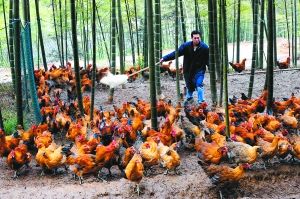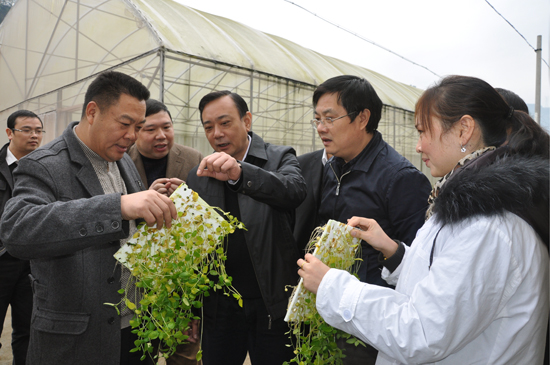Dr. Lou Mengliang, a returnee, became rich by raising chickens in the mountains.
In Wangmu Village, Economic and technological Development Zone of Deqing County, there is an inconspicuous but different chicken farm.
It is inconspicuous because it is located in a small cove and can only be found under the viaduct of Hangzhou-Nanjing Expressway along the winding village road. When I asked the villagers all the way, I saw the sign at the door that read "Wukangjiade ancestral Chicken Farm, Deqing County". Even if I saw these seven or eight neat houses, it was hard to believe that it was a chicken farmer.
It is said that it is different because the reporter walked into this huge chicken farm, did not smell any chicken shit, did not see a running chicken, and more importantly, the "chicken commander" here is a doctor studying abroad.
A shallow pool was dug at the door. The staff said: "what is put here is disinfectant, and if the cart comes in, it should be sterilized first." Disinfection is the first hurdle here. The reporter changed into work shoes on the field, sterilized the UV room for five minutes, walked through the 2-meter-long disinfection pool, and tossed around three rooms. After such a series of strict disinfection procedures, he was finally "released" to the office of the chicken farm and met the legendary Dr. Lou.

Dr. Lou, whose name is Lou Mengliang, is in his 40s. He had a pair of thick glasses on his nose, a half-old overalls and trousers stuck into a pair of rain boots. "the environment here is good, the space is empty, and the traffic is very convenient, which is why I finally settled in Wangmu Village after visiting the area around Hangzhou." As for the tedious disinfection process when entering the venue, Dr. Lou explained, "because we raise ancestral breeder chickens here, the environmental requirements are relatively more stringent. The staff have to take a bath before they come in. "
What is an ancestral breeder? "to put it simply, if the commercial chicken we buy in the market is the son's generation, the chicken in the breeder farm is the parents' generation, and the grandparents' generation is the grandparents' generation." Dr. Lou's explanation is very popular, "that is to say, the young chickens we hatch are specially supplied to the chicken breeding farm."
Dr. Lou, a native of Dongyang, studied the improved breed breeding system of livestock and poultry at Zhejiang Agricultural University in the early 1980s, and later studied abroad, majoring in animal nutrition and poultry breeding, and received a doctorate in the UK. In his view, when he returned to China to run an ancestral chicken farm, he was just putting what he had learned into practice. "at the beginning, after studying abroad and returning to China, I found that there were very few formal ancestral breeder farms in Taiwan, and the breeder seedlings were generally self-propagated and bred by themselves. The quality was generally not high, and the breeding efficiency was relatively low." So he came up with the idea of building an ancestral chicken farm and using professional knowledge to cultivate "good breeds of good breeds."
It is understood that since the completion of the Jiade ancestral chicken breeding farm in 2006, the total area of the chicken house is 4500 square meters, with a breeding scale of 20, 000 birds. At present, the main breeds are JA57 yellow-feathered breeder chicken and Hongbao breeder chicken. The chicken seedlings are imported by air from the French Hubbard Broiler Genetics and breeding Company, which has hundreds of years of high-tech breeding experience. The cost of importing chicken seedlings alone costs more than 500,000 yuan a year, and each newly hatched chicken imported from France costs more than 200 yuan per chicken. Every year, about 400000 sets of breeder chickens are hatched ("one set" for a reasonable proportion of male and female), which are sold to breeder farms in more than 20 provinces and cities across the country.
- Prev

Special Agriculture Becoming Rich in Shizhu County, Chongqing
Special Agriculture Becoming Rich in Shizhu County, Chongqing
- Next

The Top Ten Science and Technology Rich experts of National Farmers in 2011 was announced
The Top Ten Science and Technology Rich experts of National Farmers in 2011 was announced
Related
- A course of planting techniques and methods on how to grow carrots
- How to plant the latest tulips?
- Is it better to pick tea in the morning or in the afternoon? When is the best time for tea to be picked? what is the third or fifth tea?
- Launch Yuanxiao Happy combination Haocha + Tea Yuan healthy Taste
- Penghu Tourism "Fireworks 20 Parade with You"
- 2022 West Lake Happiness holds "Digital Revitalization Voucher" and draws iphone13 and laptop.
- Banqiao Fuzhou social houses are designed to change start-up combined with police elimination to create a safe and livable environment
- The convenient measure of "mechanical weeding" in Xinbei has been abused and the Agriculture Bureau has imposed heavy penalties on the illegal land consolidation.
- Changgeng University Joins Hands with Four Memory Factories to Rescue Memory Talent Shortage
- The list of Taiwan's top 100 MVP managers is listed by the Director-General of the Farmers' Association of Sanxia District.

